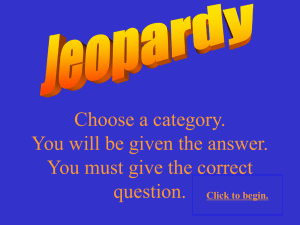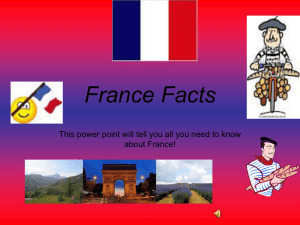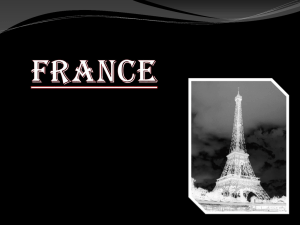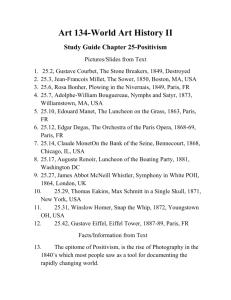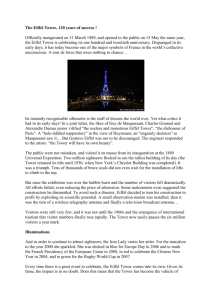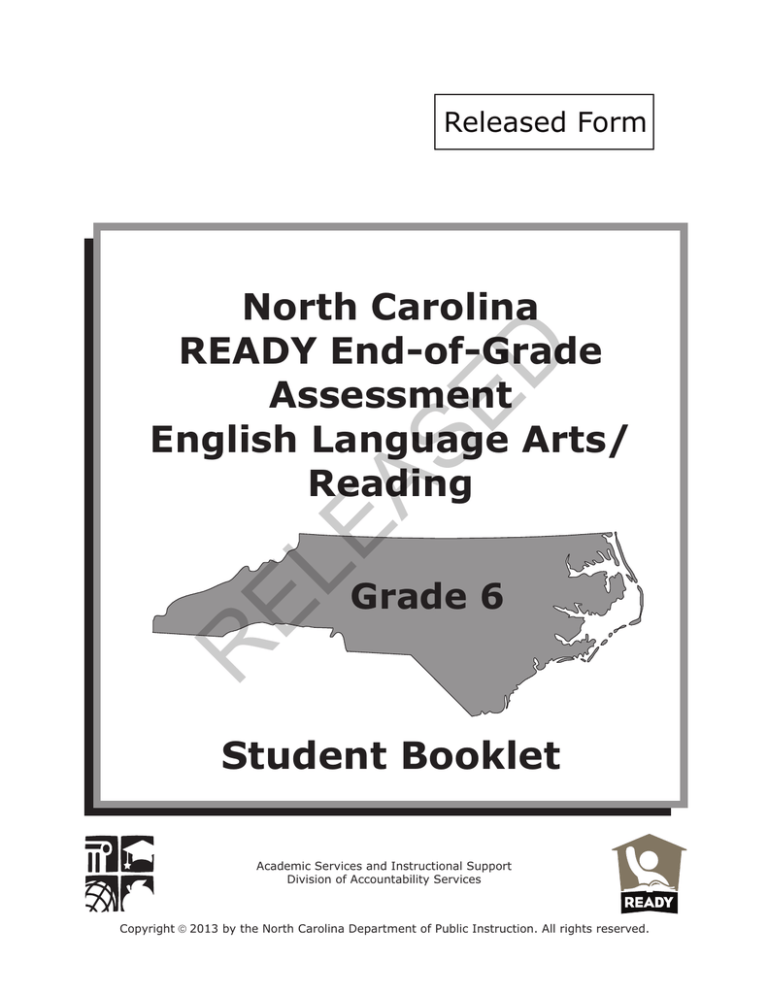
Released Form
EL
EA
SE
D
North Carolina
READY End-of-Grade
Assessment
English Language Arts/
Reading
R
Grade 6
Student Booklet
Academic Services and Instructional Support
Division of Accountability Services
Copyright ã 2013 by the North Carolina Department of Public Instruction. All rights reserved.
GRADE 6 ENGLISH LANGUAGE ARTS/READING—RELEASED FORM
Sample Questions
Song (1914)
by Rupert Brooke
D
All suddenly the wind comes soft,
And Spring is here again;
And the hawthorn quickens with buds of green,
And my heart with buds of pain.
SE
5 My heart all Winter lay so numb
EA
The earth is dead and frore,*
That I never thought the Spring would come,
Or my heart wake any more.
But Winter’s broken and earth has woken,
10 And the small birds cry again;
EL
And the hawthorn hedge puts forth its buds,
And my heart puts forth its pain.
frore: frozen
R
*
1
Go to the next page.
GRADE 6 ENGLISH LANGUAGE ARTS/READING—RELEASED FORM
A
The speaker’s heart is asleep.
B
The speaker’s heart is afraid.
C
The speaker’s heart is paralyzed.
D
The speaker’s heart is extremely cold.
D
In the second stanza, how does the poet’s choice of words impact the meaning of
the poem?
It gives the differences between Winter and Spring.
B
It describes how cold it gets during Winter.
C
It explains how the speaker views the different seasons.
D
It emphasizes the despair the speaker feels about the loss of Spring.
EA
SE
A
EL
S2
What can be inferred from line 5?
R
S1
2
GRADE 6 ENGLISH LANGUAGE ARTS/READING—RELEASED FORM
Liam McLafferty’s Choice
by Alexis O’Neill
3
It explains that Liam’s mother struggled to assist him.
B
It explains that Liam was afraid to make a decision.
C
It shows that Liam became excited about decisions.
D
It shows that Liam’s mother lacked the desire to help.
SE
D
A
EA
What does the author mean by saying that the old woman “tried to hobble up a
narrow path”?
A
The old woman was walking carefully.
B
The old woman was enjoying walking.
C
The old woman was walking briskly.
D
The old woman was having difficulty walking.
EL
2
How does endeavored affect the meaning of paragraph 6?
R
1
What did the fairy queen do that Liam’s parents failed to do?
A
She gave Liam love, care, and affection.
B
She showed Liam the best way to make a decision.
C
She asked Liam about the reasons for his choices.
D
She offered to take Liam to the Galway fair.
3
Go to the next page.
GRADE 6 ENGLISH LANGUAGE ARTS/READING—RELEASED FORM
Liam McLafferty’s Choice
by Alexis O’Neill
6
He wanted to please his teacher.
B
He wanted to please his parents.
C
He was afraid of Kieran.
D
He felt sorry for Kieran.
SE
D
A
What is the effect of the simile in paragraph 25?
to show how surprised Liam was to see fairy queen
B
to describe the speed of the old woman’s movements
C
to explain how much the fairy queen liked Liam’s choices
D
to illustrate that Liam was confused by the old woman
EA
A
EL
5
Why did Liam choose to sit beside Kieran at school?
What is the meaning of cringed in paragraph 30?
R
4
A
raised eyebrows questioningly
B
moved forward confidently
C
hunched shoulders anxiously
D
laughed jokingly
4
Go to the next page.
GRADE 6 ENGLISH LANGUAGE ARTS/READING—RELEASED FORM
Liam McLafferty’s Choice
by Alexis O’Neill
B
Liam’s ability to make choices
C
the fairy queen’s magical power
D
the fairy queen’s good sense
D
Liam’s cheerful personality
SE
A
EA
In the selection, how does the town’s view of Liam change from the beginning to
the end?
A
The townspeople worship him and then disown Liam when they find out he is
dishonest.
B
The townspeople despise him and then regret how they treated Liam when
he becomes famous.
C
The townspeople mock him and then realize Liam is the one who makes the
wisest decisions.
D
The townspeople pity him and then betray Liam when they realize he helped
a stranger.
EL
8
In paragraph 31, to what is the fairy queen referring?
R
7
5
Go to the next page.
GRADE 6 ENGLISH LANGUAGE ARTS/READING—RELEASED FORM
Gustave Eiffel, Architect of the Eiffel Tower
by Lindsey Chapman
The Eiffel Tower, designed in 1889 by Gustave Eiffel, stands today as an
iconic Paris landmark.
B
Gustave Eiffel was an engineer who designed many bridges and structures,
including the Eiffel Tower.
C
Gustave Eiffel died in 1923 and is remembered for designing the “one-hit
wonder” Eiffel Tower.
D
Engineer Gustave Eiffel was indicted for fraud while building locks in the
Panama Canal.
EA
SE
D
A
Which section of the selection summarizes the text?
A
The Introduction
B
Gustave Eiffel’s Early Days
C
Eiffel’s Notable Accomplishments
D
The Rest of the Story
EL
10
Which statement summarizes the selection?
R
9
6
Go to the next page.
GRADE 6 ENGLISH LANGUAGE ARTS/READING—RELEASED FORM
Gustave Eiffel, Architect of the Eiffel Tower
by Lindsey Chapman
13
The Eiffel Tower was originally to be built next to the Panama Canal.
B
Gustave Eiffel’s designs for the Eiffel Tower were original and widely
accepted.
C
Gustave Eiffel was sentenced to prison for fraud on his work on the Statue of
Liberty.
D
The Eiffel Tower was built to serve as a focal point for the Paris Centennial
Exposition of 1889.
EA
SE
D
A
Based on the last sentence in the paragraph 4, what does the word barbarous
emphasize?
A
disapproval and negative feelings
B
happiness and contentment
C
gratitude for a job well done
D
that an object is too expensive for what it is worth
EL
12
According to the selection, which statement is true?
R
11
Which quote from the selection is the example of Gustave Eiffel’s point of view?
A
“Artists in Paris protested the tower, calling it ‘vertiginously ridiculous’ and
‘barbarous.’ ”
B
“He couldn’t understand the criticism surrounding the project.”
C
“ ‘I ought to be jealous of the tower, it is much more famous than I am.’ ”
D
“ ‘The man behind the masterpiece gradually disappeared in the towering
shadow of his creation.’ ”
7
Go to the next page.
GRADE 6 ENGLISH LANGUAGE ARTS/READING—RELEASED FORM
Gustave Eiffel, Architect of the Eiffel Tower
by Lindsey Chapman
16
to only hit one home-run in baseball
B
to be popular for one specific accomplishment
C
to question who was responsible
D
to judge someone by their strength and power
SE
D
A
EA
How does the author support her claim that Gustave Eiffel’s creations can be found
on several continents?
A
by naming every bridge that Gustave Eiffel built
B
by listing all the masterpieces constructed by Gustave Eiffel
C
by including structures such as St. Anne Mission and Pont Faidherbe Bridge
in the selection
D
by explaining the design for Philadelphia’s 1876 Centennial Exposition
EL
15
What did blogger Tony Wheeler mean by the phrase, “one-hit wonder” in the last
paragraph?
R
14
How does the selection support the idea that Gustave Eiffel is best known for his
tower?
A
It describes Eiffel’s early work as a civil engineer.
B
It contrasts Eiffel’s tower in Paris with the one planned in Philadelphia.
C
It details how his career was damaged through constant scandal.
D
It states that Eiffel’s name and the monument became one and the same.
8
Go to the next page.
GRADE 6 ENGLISH LANGUAGE ARTS/READING—RELEASED FORM
Be a Friend
by Edgar A. Guest
D
Be a friend. You don’t need money;
Just a disposition sunny;
Just the wish to help another
Get along some way or other;
5 Just a kindly hand extended
Out to one who’s unbefriended;
Just the will to give or lend,
This will make you someone’s friend.
EA
SE
Be a friend. You don’t need glory.
10 Friendship is a simple story.
Pass by trifling errors blindly,
Gaze on honest effort kindly,
Cheer the youth who’s bravely trying,
Pity him who’s sadly sighing;
15 Just a little labor spend
On the duties of a friend.
R
EL
Be a friend. The pay is bigger
(Though not written by a figure)
Than is earned by people clever
20 In what’s merely self-endeavor.*
You’ll have friends instead of neighbors
For the profits of your labors;
You’ll be richer in the end
Than a prince, if you’re a friend.
*
self-endeavor: an attempt to achieve
a goal or task on one’s own
9
Go to the next page.
GRADE 6 ENGLISH LANGUAGE ARTS/READING—RELEASED FORM
Being a friend is easy, and the rewards are great.
B
Being a friend is fun, and it takes very little time.
C
Being a friend is boring, and it is too difficult.
D
Being a friend is a big burden, and it takes a lot of time.
someone having many enemies
B
someone having many friends
C
someone having no enemies
D
someone having no friends
SE
A
D
Based on the poem, what is the meaning of unbefriended in line 6?
EA
19
A
What is the meaning of line 10?
A
Being a friend is its own reward.
B
Being a friend is a difficult task.
C
Being a friend is not hard work.
D
Being a friend is not forgotten.
EL
18
What is the central idea of the poem?
R
17
10
Go to the next page.
GRADE 6 ENGLISH LANGUAGE ARTS/READING—RELEASED FORM
It suggests that being a friend means overlooking flaws.
B
It suggests that being a friend means giving up riches.
C
It suggests that being a friend means overcoming obstacles.
D
It suggests that being a friend means helping those in need.
D
Which statement describes how the first and third stanzas have similar central
ideas?
Both suggest it is better to give than receive.
B
Both suggest wealth attracts the unbefriended.
C
Both suggest money comes between friends.
D
Both suggest friendship is the greatest wealth.
SE
A
EA
22
A
How is the third stanza different from the two previous stanzas?
EL
21
How does line 11 contribute to the poem’s theme?
A
The third stanza tells the reader how to be a good friend.
B
The third stanza tells the reader the benefits of being a friend.
C
The third stanza does not rhyme, but the other two stanzas rhyme.
D
The third stanza rhymes, but the other two stanzas do not rhyme.
R
20
11
Go to the next page.
GRADE 6 ENGLISH LANGUAGE ARTS/READING—RELEASED FORM
Silk’s Superpowers
by Rachel Ehrenberg
Scientists have learned a great deal from their study of silkworms and silk.
B
Spiders are fascinating and interesting arachnids.
C
Scientists are just beginning to discover the many uses of spider and insect
silk.
D
Silkworm silk is far superior to that made by spiders.
D
A
SE
24
Which statement summarizes the selection?
What is the meaning of the word mimic as used in the sentence below?
EA
23
25
break
B
stretch
C
copy
D
sell
R
A
EL
“ ‘If you can mimic it, you can eliminate an awful lot of the problems you have
with all the man-made fibers that are currently available.’ ”
Based on paragraph 8, what is the meaning of the word diverse?
A
colorful
B
different
C
similar
D
modern
12
Go to the next page.
GRADE 6 ENGLISH LANGUAGE ARTS/READING—RELEASED FORM
Silk’s Superpowers
by Rachel Ehrenberg
28
It is important for spiders to use sticky silk to catch prey.
B
Spiders must use a stronger silk for the outline of their web.
C
It is important to have stiff silk to protect spider eggs.
D
Spiders are capable of creating a variety of silks for different needs.
SE
D
A
A
protein
B
milk
C
enzymes
D
glue
EA
What is the main ingredient in silk?
EL
27
What is the central idea of paragraph 12?
According to the selection, why are scientists studying a variety of
animal-produced silk?
R
26
A
to find a way to make silk less sticky
B
to produce a silk without the harsh chemicals in man-made fibers
C
to discover a silk strong enough to pull a fish from water
D
to find a way to make the spinning process shorter
13
Go to the next page.
GRADE 6 ENGLISH LANGUAGE ARTS/READING—RELEASED FORM
Silk’s Superpowers
by Rachel Ehrenberg
31
It can be used to replace weak or damaged cells.
B
It can provide a flexible, porous place for cells to move.
C
It provides a temporary structure for cells to thrive.
D
It provides a rigid and permanent home for cells.
SE
D
A
What is the impact of paragraph 14?
It allows the reader to imagine what a golden spider looks like.
B
It allows the reader to realize how strong spider silk is.
C
It informs the reader of the disadvantages of silk made by spiders.
D
It informs the reader of the scientific name of the garden spider.
EA
A
EL
30
How will the study of spider silk benefit human cells?
Which explains the author’s purpose in writing this selection?
R
29
A
to inform the reader that silk might make good vests
B
to inform the reader about the chemical composition of silk
C
to inform the reader that different species of spiders spin silk differently
D
to inform the reader about the different types and uses of silk
14
Go to the next page.
GRADE 6 ENGLISH LANGUAGE ARTS/READING—RELEASED FORM
The Totem Pole Challenge
by The TaleWagger
34
Never read books and leave them unattended.
B
Hard work done properly pays off in the end.
C
Rushing through your work may sometimes be necessary.
D
Do not discard books, as it takes too long to write them.
SE
D
A
Which quote from the selection illustrates the central idea of the selection?
“In that case, you’d better sit down and listen carefully.”
B
“ ‘I have decided that we should leave the story of our lives for others to
see.’ ”
C
“ ‘Anybody can make a totem pole, it’s easy!’ they chanted.”
D
“You see Mike, everything done properly is never as ‘easy’ as it first seems!”
EA
A
EL
33
Which statement summarizes the theme of this selection?
R
32
In the selection, why did the Chief believe that the village should have a totem
pole?
A
The totem pole would be a record of the village history.
B
The neighboring villages each had totem poles.
C
The totem pole would make his sons famous.
D
His sons needed to learn to find good totem pole wood.
15
Go to the next page.
GRADE 6 ENGLISH LANGUAGE ARTS/READING—RELEASED FORM
The Totem Pole Challenge
by The TaleWagger
35
Based on the sentence below from paragraph 16, what does the word adamant tell
the reader about how the sons felt?
“However, his sons were adamant.”
B
The sons were annoyed at their father.
C
The sons were firm in their opinions.
D
The sons were delighted at the challenge.
EA
SE
D
The sons were confused at the dilemma.
In the selection, what was the grandfather trying to teach his grandson by telling
the fable?
No one should ever destroy another person’s property.
B
Writing a book is much more difficult than creating a totem pole.
C
People gain more appreciation for the value of something when they have
tried to create it.
D
Books and totem poles are valuable and should be preserved and shared for
historical purposes.
EL
A
R
36
A
16
Go to the next page.
GRADE 6 ENGLISH LANGUAGE ARTS/READING—RELEASED FORM
The Totem Pole Challenge
by The TaleWagger
37
In the sentence below, what does the word inhospitable mean?
unimpressive
C
unimportant
D
unhealthy
SE
B
EA
unfriendly
What purpose is served by paragraph 25?
It describes how the third son was thanked by the village for creating a
totem pole.
B
It explains that the first son was the last son to complete a village totem
pole.
C
It describes how the first son brought firewood to the village instead of
creating a totem pole.
D
It explains that the first son’s totem pole was a reflection of his preparation
during the winter.
EL
A
R
38
A
D
“The third son traveled afar, through the deep snow of the inhospitable
countryside, to seek out the wigwams of the totem pole makers.”
17
Go to the next page.
GRADE 6 ENGLISH LANGUAGE ARTS/READING—RELEASED FORM
The Totem Pole Challenge
by The TaleWagger
Based on the selection, what does the American Indian culture value?
the talent and commitment needed to create something lasting
B
the ability to prepare for and complete a task quickly
C
helping the community overcome challenges caused by nature
D
helping senior citizens feel like they are a part of the community
EL
EA
SE
D
A
R
39
18
Go to the next page.
GRADE 6 ENGLISH LANGUAGE ARTS/READING—RELEASED FORM
Be a Fit Kid
42
only when friends are around
B
on certain special occasions
C
only during the school week
D
on days when school is out
SE
D
A
Based on the information in the “Drink Water and Milk Most Often” section, what is
the main concern for someone who consumes only soft drinks?
That person will have cavities in their teeth.
B
That person is getting a variety of nutrients.
C
That person will maintain a healthy weight.
D
That person is getting lots of extra calories.
EA
A
EL
41
According to the selection, when would be an exception to following the five rules?
Which statement summarizes the “Drink Water and Milk Most Often” section?
R
40
A
Kids should drink water and milk each day to be healthy.
B
Water is more important than any other drink.
C
Kids need a lot less calcium in their diets than adults.
D
Calcium-rich foods can replace drinking milk.
19
Go to the next page.
GRADE 6 ENGLISH LANGUAGE ARTS/READING—RELEASED FORM
Be a Fit Kid
45
B
delicious, sweet desserts
C
exciting video games
D
essential substances
D
healthy, fun activities
SE
A
According to the selection, how can kids contribute to their own health?
Use the computer for the majority of their entertainment.
B
Play as many video games as possible on weekends.
C
Choose fun sports or games in which they can participate.
D
Eat well during the week, but indulge over the weekends.
EA
A
EL
44
In paragraph 5, what are nutrients?
If a kid tries and then dislikes an activity, which would be a healthy response?
A
Quit doing any physical activity.
B
Become angry for wasting the time.
C
Advise other kids not to do it.
D
Choose a different activity to do.
R
43
20
Go to the next page.
GRADE 6 ENGLISH LANGUAGE ARTS/READING—RELEASED FORM
Be a Fit Kid
48
“People who care (parents, doctors, teachers, and others) want to know how
to help kids be more fit.”
B
“You might even write down a list of fun stuff to do, so you can refer to it
when your mom or dad says it’s time to stop watching TV or playing
computer games!”
C
“For instance, they can stock the house with healthy foods and plan physical
activities for the family.”
D
“Tell your parents about these five steps you want to take and maybe you
can teach them a thing or two.”
EA
SE
D
A
Which states the author’s attitude toward physical activity?
A
Kids should find a fun way to be active.
B
Video games encourage kids to be active.
C
Schools should limit students’ time on computers.
D
Kids should do activities that are challenging.
EL
47
Which sentence from the selection supports the assumption that parents have the
most important role in keeping children healthy?
R
46
How does the author encourage healthy eating?
A
by warning the reader about the dangers of gaining too much weight
B
by providing the reader with simple suggestions
C
by comparing the nutritional information of healthy and unhealthy food
D
by sharing success stories of kids in real life
21
Go to the next page.
GRADE 6 ENGLISH LANGUAGE ARTS/READING—RELEASED FORM
This is the end of the English Language Arts/Reading test.
Directions:
1. Look back over your answers for the test questions.
2. Put all of your papers inside your test book and close your test book.
R
EL
EA
SE
D
3. Stay quietly in your seat until your teacher tells you that testing is
finished.
22
D
SE
EA
ACKNOWLEDGMENTS
EL
The North Carolina Department of Public Instruction wishes to express gratitude to the following
authors and publishers, whose generous permission to reprint literary selections has made these
tests possible. Every effort has been made to locate the copyright owners of material reprinted in
this test booklet. Omissions brought to our attention will be corrected in subsequent editions.
R
“Liam McLafferty’s Choice” by Alexis O'Neill reprinted by permission of Cricket magazine, March
1997, copyright © 1997 by Alexis O'Neill.
“Gustave Eiffel, Architect of the Eiffel Tower” by Lindsey Chapman from Finding Dulcinea,
15 December 2009. From BBC News at
http://www.findingdulcinea.com/features/profiles/e/gustave-eiffel.html. (12/15/2010.)
“Be a Friend” from A Heap o' Livin' by Edgar A. Guest. Project Gutenberg, 2008.
http://www.gutenberg.org/ebooks/328 (09/15/2010).
“Silk’s Superpowers” by Rachel Ehrenberg from Science News for Kids, May 6, 2009.
http://www.sciencenewsforkids.org/20090506/Feature1.asp (05/25/2010). Copyright © 2009
Reprinted with Permission of Science News.
“The Totem Pole Challenge” by The TaleWagger from http://short-stories.org.uk. © Copyright 2001
The Talewagger. Used by permission of Mike Chapman, The TaleWagger.
“Be a Fit Kid,” this information was provided by KidsHealth®, one of the largest resources online for
medically reviewed health information written for parents, kids, and teens. For more articles like
this, visit KidsHealth.org or TeensHealth.org. © 1995–2013. The Nemours Foundation/KidsHealth®.
All rights reserved.
GRADE 6 ENGLISH LANGUAGE ARTS/READING—RELEASED FORM
Type
Key
S1
MC
C
S2
MC
D
1
MC
A
L — Language
2
MC
D
RL — Reading: Literature
3
MC
C
RL — Reading: Literature
4
MC
D
RL — Reading: Literature
5
MC
B
L — Language
6
MC
C
L — Language
7
MC
B
RL — Reading: Literature
8
MC
C
RL — Reading: Literature
9
MC
B
RI — Reading: Informational Text
10
MC
A
RI — Reading: Informational Text
11
MC
D
RI — Reading: Informational Text
MC
A
RI — Reading: Informational Text
MC
C
RI — Reading: Informational Text
MC
B
L — Language
MC
C
RI — Reading: Informational Text
MC
D
RI — Reading: Informational Text
17
MC
A
RL — Reading: Literature
18
MC
D
L — Language
19
MC
C
RL — Reading: Literature
20
MC
A
RL — Reading: Literature
21
MC
D
RL — Reading: Literature
22
MC
B
RL — Reading: Literature
23
MC
C
RI — Reading: Informational Text
24
MC
C
L — Language
14
15
16
SE
EL
13
R
12
Primary Standard
D
Item number
EA
Grade 6 English Language Arts/Reading
RELEASED Form
2012–2013
Answer Key
GRADE 6 ENGLISH LANGUAGE ARTS/READING—RELEASED FORM
Item number
Type
Key
25
MC
B
L — Language
26
MC
D
RI — Reading: Informational Text
27
MC
A
RI — Reading: Informational Text
28
MC
B
RI — Reading: Informational Text
29
MC
C
RI — Reading: Informational Text
30
MC
B
RI — Reading: Informational Text
31
MC
D
RI — Reading: Informational Text
32
MC
B
RL — Reading: Literature
33
MC
D
RL — Reading: Literature
34
MC
A
RL — Reading: Literature
35
MC
C
L — Language
36
MC
C
RL — Reading: Literature
37
MC
A
L — Language
38
MC
D
RL — Reading: Literature
39
MC
A
RL — Reading: Literature
40
MC
B
RI — Reading: Informational Text
41
MC
D
RI — Reading: Informational Text
MC
A
RI — Reading: Informational Text
MC
D
L — Language
MC
C
RI — Reading: Informational Text
43
D
SE
EA
45
R
44
EL
42
Primary Standard
MC
D
RI — Reading: Informational Text
46
MC
C
RI — Reading: Informational Text
47
MC
A
RI — Reading: Informational Text
48
MC
B
RI — Reading: Informational Text
Item Types:
MC = multiple choice
Note about selections:
Reading for literature texts can be stories or poems.
Reading for informational texts can be scientific, historical, economic, or technical.

